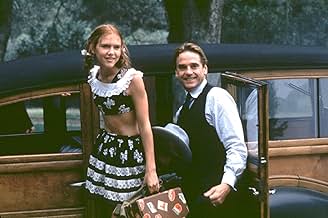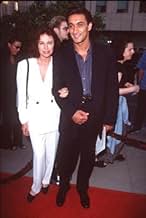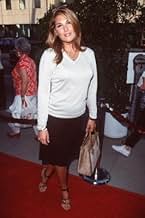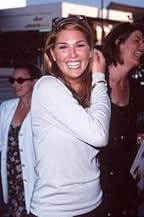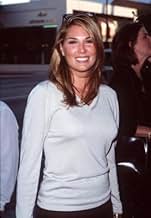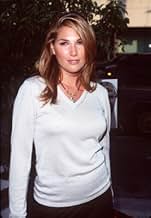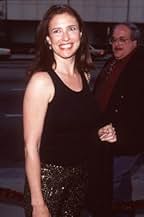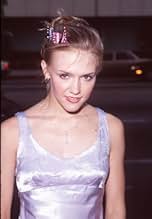Un homme se marie avec propriétaire afin qu'il puisse profiter de sa filleUn homme se marie avec propriétaire afin qu'il puisse profiter de sa filleUn homme se marie avec propriétaire afin qu'il puisse profiter de sa fille
- Réalisation
- Scénario
- Casting principal
- Récompenses
- 2 victoires et 4 nominations au total
Pat Pierre Perkins
- Louise
- (as Pat P. Perkins)
Emma Griffiths Malin
- Annabel Lee
- (as Emma Griffiths-Malin)
Avis à la une
I'm not sure about my opinion on this movie. It was definetly interesting, to say the least. I haven't read the novel yet, however I will, as soon as I have the chance to do so.
What made me unsure is the storyline, as it was very disturbing for me, many scenes caused me discomfort. It has gone to the point that I had to stop watching the movie 30 minutes in, and continued it in another time when I was alone, because for some reason I felt quilty while watching it. Aside from this, I actually found the storyline to be well written, and I liked it. When I saw this movie I was around the same age as Dolores so maybe for that reason it was really meaningful to me.
In conclusion I surprisingly enjoyed the movie, even though i've felt uncomfortable many times in the proccess of watching it.
Briefly put, this film is a quite brilliant adaptation of the novel. While staying pretty faithful to the original source, Stephen Schiff's screenplay fleshes out the primary characters and their relationship, which plays out as a taboo but reserved love story. Maintaining the central themes, the plot is reduced to the essence of the major players and the linear events of the book. It's almost impossible to adapt a long book into the confines of a single average-length movie, but Schiff captures most of the important moments quite well and humanizes the characters who could have come off as bizarre depictions from Humbert's narrative.
Lyne's movie is at once haunting, compelling, and beautifully photographed. For all the controversy, it is a mature, reflective, and subtle film. "Lolita" is a challenging piece of work that sublimely reflects the pathos of the story and manages to retain bits of the complex humor of Nabokov. This "Lolita" abandons the notion of being a complete social satire and works as an essentially dramatic portrayal of a doomed, inappropriate romance that is ultimately a sad, tragic tale.
The performances are remarkable, especially those of Jeremy Irons and Dominique Swain. Irons is utterly perfect as the ill-fated wretch, Humbert Humbert. So understated but evocative with every move and gesture, he is the definitive Old-World European whose obsession bristles beneath his timorous demeanor. He evokes an incredible amount of sympathy for the character. Swain delivers an on-target portrayal of the flowering nymphet who toys with her burgeoning sexuality but hasn't overcome her fundamental brattiness. Swain elicits both allure and pity as the wayward character whose immaturity in mindset and behavior does not excuse her complicity in her affairs. Despite what some critics may have written, Melanie Griffith is fine in the small role as Lolita's overbearing mother. She is comically obtuse, and her veneer hits all the right, grating notes. Frank Langella rounds out the cast as the mysterious Quilty. He is appropriately shady, vague, and sinister when he appears from time to time, slowly revealing himself.
This is a real winner on many levels and should be up for several awards including best picture, director, actor, actress, and adapted screenplay. Showtime should be congratulated for its smart acquisition. I hope the movie finds its way to the largest possible audience.
Lyne's movie is at once haunting, compelling, and beautifully photographed. For all the controversy, it is a mature, reflective, and subtle film. "Lolita" is a challenging piece of work that sublimely reflects the pathos of the story and manages to retain bits of the complex humor of Nabokov. This "Lolita" abandons the notion of being a complete social satire and works as an essentially dramatic portrayal of a doomed, inappropriate romance that is ultimately a sad, tragic tale.
The performances are remarkable, especially those of Jeremy Irons and Dominique Swain. Irons is utterly perfect as the ill-fated wretch, Humbert Humbert. So understated but evocative with every move and gesture, he is the definitive Old-World European whose obsession bristles beneath his timorous demeanor. He evokes an incredible amount of sympathy for the character. Swain delivers an on-target portrayal of the flowering nymphet who toys with her burgeoning sexuality but hasn't overcome her fundamental brattiness. Swain elicits both allure and pity as the wayward character whose immaturity in mindset and behavior does not excuse her complicity in her affairs. Despite what some critics may have written, Melanie Griffith is fine in the small role as Lolita's overbearing mother. She is comically obtuse, and her veneer hits all the right, grating notes. Frank Langella rounds out the cast as the mysterious Quilty. He is appropriately shady, vague, and sinister when he appears from time to time, slowly revealing himself.
This is a real winner on many levels and should be up for several awards including best picture, director, actor, actress, and adapted screenplay. Showtime should be congratulated for its smart acquisition. I hope the movie finds its way to the largest possible audience.
Lyne's point of departure from the Kubrick version of Nabokov's great novel lies primarily in tone: the later version focuses more on the tragic, dramatic elements of the book and less on the comedic ones. I will not go so far as to suggest that Lyne made a better film; he did not. I do think, however, that he did pinpoint one of the key components of the novel's genius: a capturing of life on the newly paved highways of mid-century America. As Humbert, Jeremy Irons is as good as his predecessor James Mason. Frank Langella's interpretation of Quilty entirely diverges from the one given by Peter Sellers (and rightfully so; who wants to compete with Sellers?). But it is Dominique Swain, outdoing Sue Lyon, who comes closer than what ever seemed possible to embodying the essence of the doomed Dolly Haze.
I never read Nabokov's novel nor did I watch Kubrick's Lolita, but I liked this one - yes, my feelings sometimes were ambivalent regarding some scenes, but well, I guess that was Nabokov's aim and that of the director. Production is excellent, acting too. A good one that questions in its best moments our perception of reality and our moral values.
Nabokov's best novel save for Pale Fire will probably never get an "ideal" filming, unless someone decides to actually commit Nabokov's own script to celluloid (he wrote it for the 1962 version, and his name appears in the credits, but the finished product was almost wholly the product of Kubrick's pen and Peter Sellers' ad-libbing). But I like both the Kubrick and the Lyne versions, with reservations.
With Kubrick's, the only real problem is that it's not Nabokov. James Mason's performance contains the core of an accurate portrayal of Humbert, and he's often moving. But Sue Lyon was too old for her part and Sellers' Quilty is an altogether different conception from the author's (not that he isn't lots of fun). The film also suffers from having been filmed in the UK. Nabokov had a complex vision of America - vast, tacky, seductive, and grindingly mundane all at the same time - and this just can't be conveyed in a studio and with a few well-chosen locations.
That's where Lyne's version excels. His compositions (or his cinematographer's) are indeed beautiful to look at, and (I think) capture suburban and roadside America very much the way Humbert would have experienced them. Irons is fine as Humbert, although the typecasting was initially painful to contemplate, and Swain is a vast improvement over Lyon as young Dolores: still a bit too old for the part (an inevitable problem, perhaps, for anyone who wants to film this book), but her intelligent performance makes up for this. Despite his cheesy reputation, Lyne wisely refrains from making his Lolita a teenage bombshell, something the more artistic Kubrick couldn't resist.
Again, however, the problem is Quilty. Both directors obviously felt compelled to render in three dimensions a character who is one of Nabokov's phantoms: Does he really exist? Who is he and what do we know about him, outside of Humbert's increasingly paranoid imaginings? Can we trust anything at all that's said about him in this book? I expect that Nabokov himself regretted having to bring Quilty out of the shadows at all for the denouement.
Sellers carried off the role with style, making you forget for a moment that his routines seem to have wandered in from another film. Lyne turns the final confrontation between Humbert and Quilty (there is no flashback framing device, as in Kubrick) into pure Grand Guignol, and so we have to endure watching poor, paunchy Frank Langella running down a hallway of his ridiculously overstuffed house, his bathrobe falling open to reveal his endowments to our embarrassed gaze before being blown away Dirty Harry-style by the avenging Humbert. A major wrong note to say the least.
So Quilty, in the end, defeats both of Nabokov's filmic approximators. But if you love the book, see both movies: Kubrick and Lyne each capture different aspects of the master's great story in valuable ways, and the new Lolita is clearly Lyne's best work yet, proving that a great novel can inspire excellent filmmaking, if not guarantee an "ideal" adaptation.
What we really need now, however, is not a third version of Lolita, but finally, a filming of Lolita: A Screenplay. Nabokov had fun writing this, and any fan of his should read his script as well. Wouldn't you like to see a move of Lolita in which Humbert, searching through the woods for his Lo, encounters a butterfly collector named Vladimir Nabokov? Of course you would!
With Kubrick's, the only real problem is that it's not Nabokov. James Mason's performance contains the core of an accurate portrayal of Humbert, and he's often moving. But Sue Lyon was too old for her part and Sellers' Quilty is an altogether different conception from the author's (not that he isn't lots of fun). The film also suffers from having been filmed in the UK. Nabokov had a complex vision of America - vast, tacky, seductive, and grindingly mundane all at the same time - and this just can't be conveyed in a studio and with a few well-chosen locations.
That's where Lyne's version excels. His compositions (or his cinematographer's) are indeed beautiful to look at, and (I think) capture suburban and roadside America very much the way Humbert would have experienced them. Irons is fine as Humbert, although the typecasting was initially painful to contemplate, and Swain is a vast improvement over Lyon as young Dolores: still a bit too old for the part (an inevitable problem, perhaps, for anyone who wants to film this book), but her intelligent performance makes up for this. Despite his cheesy reputation, Lyne wisely refrains from making his Lolita a teenage bombshell, something the more artistic Kubrick couldn't resist.
Again, however, the problem is Quilty. Both directors obviously felt compelled to render in three dimensions a character who is one of Nabokov's phantoms: Does he really exist? Who is he and what do we know about him, outside of Humbert's increasingly paranoid imaginings? Can we trust anything at all that's said about him in this book? I expect that Nabokov himself regretted having to bring Quilty out of the shadows at all for the denouement.
Sellers carried off the role with style, making you forget for a moment that his routines seem to have wandered in from another film. Lyne turns the final confrontation between Humbert and Quilty (there is no flashback framing device, as in Kubrick) into pure Grand Guignol, and so we have to endure watching poor, paunchy Frank Langella running down a hallway of his ridiculously overstuffed house, his bathrobe falling open to reveal his endowments to our embarrassed gaze before being blown away Dirty Harry-style by the avenging Humbert. A major wrong note to say the least.
So Quilty, in the end, defeats both of Nabokov's filmic approximators. But if you love the book, see both movies: Kubrick and Lyne each capture different aspects of the master's great story in valuable ways, and the new Lolita is clearly Lyne's best work yet, proving that a great novel can inspire excellent filmmaking, if not guarantee an "ideal" adaptation.
What we really need now, however, is not a third version of Lolita, but finally, a filming of Lolita: A Screenplay. Nabokov had fun writing this, and any fan of his should read his script as well. Wouldn't you like to see a move of Lolita in which Humbert, searching through the woods for his Lo, encounters a butterfly collector named Vladimir Nabokov? Of course you would!
Le saviez-vous
- AnecdotesAs Dominique Swain was a minor at age 15 when the movie was filmed, an adult body double had to be used for most of the sex scenes.
- GaffesCharlotte threatens to "ground" Lolita. Though the term was known to airmen it would not assume its current familiar meaning for many years.
- Citations
[first lines]
Humbert: [voiceover] She was Lo, plain Lo, in the morning, standing four feet ten in one sock. She was Lola in slacks, she was Dolly at school. She was Dolores on the dotted line. But in my arms she was always - Lolita. Light of my life, fire of my loins. My sin. My soul.
[whispered]
Humbert: Lolita.
- Crédits fousAfter the credits are over there is a brief clip where Lolita is shown juggling a red apple.
- Versions alternativesThe film was slightly cut to avoid a 'Not under 18' rating in Germany. An uncut version has been released on video.
Meilleurs choix
Connectez-vous pour évaluer et suivre la liste de favoris afin de recevoir des recommandations personnalisées
- How long is Lolita?Alimenté par Alexa
Détails
Box-office
- Budget
- 62 000 000 $US (estimé)
- Montant brut aux États-Unis et au Canada
- 1 071 255 $US
- Week-end de sortie aux États-Unis et au Canada
- 19 492 $US
- 26 juil. 1998
- Montant brut mondial
- 1 071 255 $US
- Durée2 heures 17 minutes
- Couleur
- Mixage
- Rapport de forme
- 1.85 : 1
Contribuer à cette page
Suggérer une modification ou ajouter du contenu manquant


